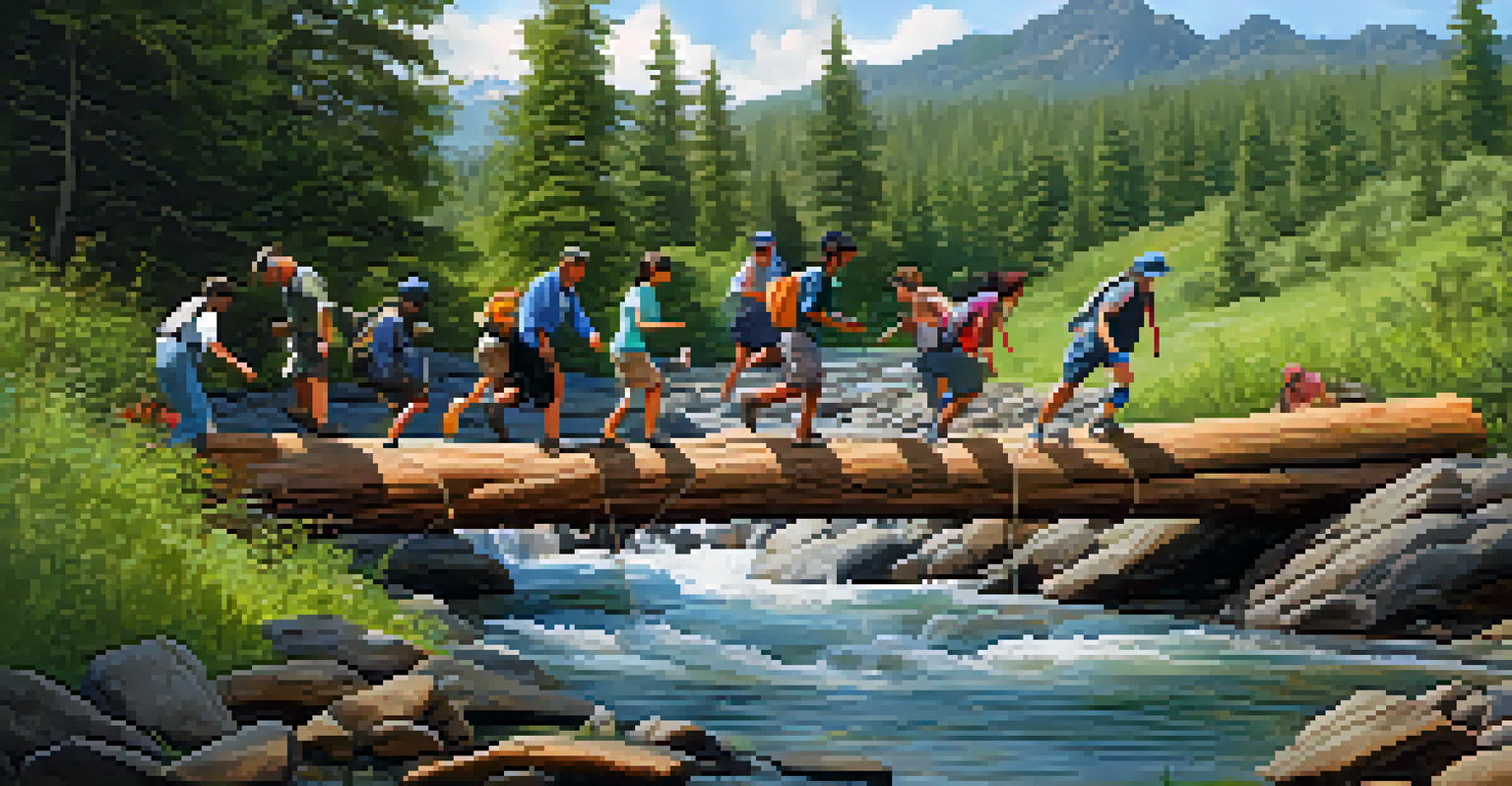Fostering Leadership Skills with Outdoor Education

Understanding Leadership Skills in Outdoor Settings
Leadership skills encompass a range of abilities, including decision-making, communication, and teamwork. In outdoor education, these skills come to life as participants face real challenges in nature. For instance, navigating a hiking trail requires not just physical endurance but the ability to plan and lead a group effectively.
The greatest leader is not necessarily the one who does the greatest things. He is the one that gets the people to do the greatest things.
When participants are placed in unfamiliar environments, they must adapt and collaborate. This unpredictability fosters resilience and problem-solving—key components of effective leadership. Imagine a group trying to set up a campsite; they must communicate clearly and delegate tasks to succeed.
Outdoor education scenarios naturally encourage individuals to step up and lead. The hands-on experience of overcoming obstacles, like building a fire or organizing a group activity, cultivates confidence that can translate to various leadership roles in life.
Building Teamwork Through Group Activities
Teamwork is crucial in any leadership role, and outdoor education provides ample opportunities for group activities. Whether it's a ropes course or a group hike, participants learn to rely on one another to achieve common goals. This shared experience strengthens bonds and enhances collaborative skills.

Consider a scenario where a team must cross a river using only limited resources. Each member must communicate their ideas, listen to others, and work together to find the best solution. Such activities highlight the importance of teamwork in leadership, showing that success often hinges on collective effort.
Leadership Skills Thrive Outdoors
Outdoor education fosters essential leadership skills through real challenges that enhance decision-making, communication, and teamwork.
Moreover, these activities encourage participants to reflect on their roles within a team. They learn to recognize their strengths and weaknesses, allowing them to better understand how they can contribute to group dynamics in both outdoor and everyday settings.
Developing Communication Skills in Nature
Effective communication is at the heart of successful leadership, and outdoor education challenges participants to hone this skill. In the midst of nature, where distractions are minimal, individuals can practice clear and concise communication. For example, guiding a group through a challenging trail requires precise instructions and encouragement.
Leadership and learning are indispensable to each other.
Additionally, outdoor settings often necessitate non-verbal communication, such as using gestures or expressions. This aspect widens the scope of communication skills and teaches participants to be attuned to the needs of others. Imagine leading a group silently across a delicate environment; understanding body language becomes essential.
As participants engage in these experiences, they become more confident in expressing their ideas and listening actively. This two-way communication is vital for any leader, enabling them to foster an inclusive environment where everyone feels heard and valued.
Enhancing Problem-Solving Skills Through Challenges
Outdoor education is rich with opportunities to tackle unexpected challenges, making it an ideal environment for enhancing problem-solving skills. Whether it's a sudden change in weather or a navigation error, participants must think critically and adapt quickly. This ability to pivot is a hallmark of effective leadership.
For instance, if a group gets lost during a hike, they must collectively analyze their situation and devise a plan. This experience teaches participants to remain calm under pressure and to engage their critical thinking skills. It's a real-world application of leadership where quick, reasoned decisions are vital.
Teamwork Strengthens Leadership
Collaborative outdoor activities promote teamwork, allowing participants to understand their roles and contribute effectively to group dynamics.
Through these challenges, participants learn that failure is often part of the process. Embracing mistakes as learning opportunities fosters a growth mindset, essential for any leader looking to inspire their team through adversity.
Cultivating Confidence in Leadership Roles
Confidence is key in leadership, and outdoor education helps participants build this essential trait. As individuals face and overcome challenges in a supportive environment, they gain a sense of accomplishment. Each successful endeavor, whether it's scaling a rock wall or completing a group project, boosts their self-esteem.
This newfound confidence can be transformative. Participants often find themselves taking on more leadership roles not just in outdoor settings but in their everyday lives as well. For example, someone who led a camping trip might feel empowered to lead a project at work.
Moreover, the encouragement from peers in outdoor education reinforces this confidence. Positive feedback and recognition from fellow participants create a supportive atmosphere that fosters personal growth and leadership development.
Learning Resilience Through Outdoor Experiences
Resilience is another critical leadership skill, and outdoor education places participants in situations that test their perseverance. Facing adverse conditions, such as bad weather or challenging terrain, teaches individuals to push through difficulties. This grit is essential for any leader who must navigate the ups and downs of their responsibilities.
Consider a scenario where a group encounters rain during a camping trip. Instead of giving up, they must adapt their plans and find new ways to enjoy the experience. This flexibility in the face of adversity is a valuable lesson in resilience that leaders can draw upon in various situations.
Resilience Built Through Challenges
Facing unexpected challenges in nature teaches participants resilience, a crucial trait for effective leadership in any setting.
Furthermore, overcoming these challenges together fosters a sense of camaraderie. Participants learn that they can rely on one another for support, which builds a resilient team dynamic—a crucial element of effective leadership.
Applying Leadership Skills Beyond Outdoor Education
The leadership skills developed through outdoor education extend far beyond the wilderness. Participants often find that the lessons learned in nature can be applied in school, work, and personal relationships. For example, the teamwork and communication skills honed during a group hike can enhance collaboration in a workplace setting.
Many individuals report feeling more equipped to handle challenges in everyday life after engaging in outdoor education. The confidence gained from leading a group activity translates into a willingness to take initiative in various aspects of life. This ripple effect showcases the power of experiential learning.

Ultimately, the skills nurtured in outdoor education create well-rounded leaders. As they navigate different environments, these individuals become adaptable, confident, and prepared to inspire others, proving that leadership is not confined to a traditional office setting.